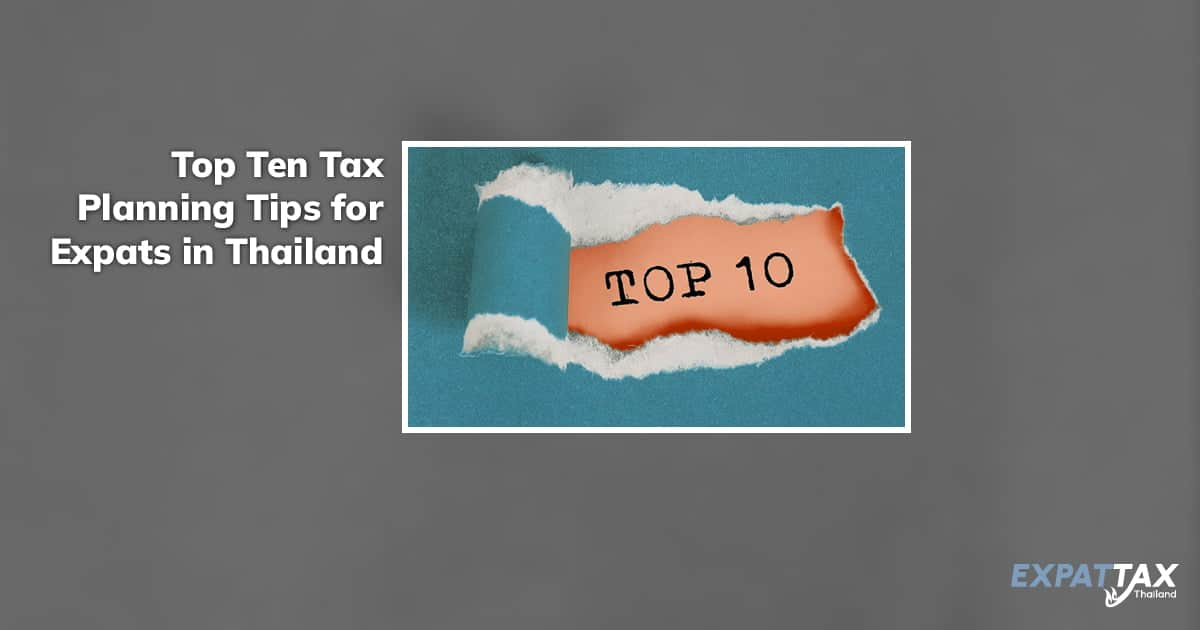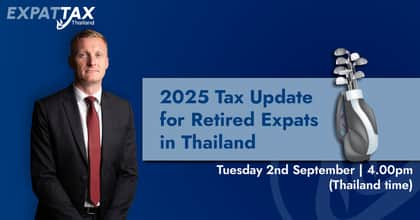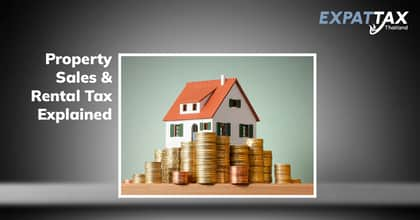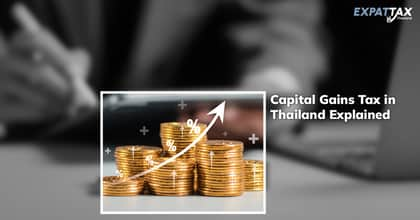
Navigating the Thai tax system can be complex for expats. This guide offers simple tax planning tips to help you manage your tax obligations, avoid double taxation, follow residency rules, and use tax deductions and credits. Whether you’re new to Thailand or a long-term expat, these tips will empower you to take control of your tax situation and secure your financial well-being.
Ten Tax Planning Tips Summarised
- Understand the new expat tax rules
- Assess your tax residency status to find out if the rules apply to you
- Understand assessable income
- Remember that taxes only apply to overseas income that is sent to Thailand
- Avoid paying tax twice by understanding Double Taxation Agreements (DTAs)
- Check your allowances when calculating your tax bill
- Reduce your tax bill by claiming all your tax deductions
- Live in Thailand tax-free by applying for a Long-Term Resident (LTR) Visa
- Acquire a Tax Identification Number
- For clarity and confidence, consult with a tax professional
Tax Planning Tip 1: Understand the New Expat Tax Rules
Thailand announced a new interpretation of the tax rules, which will be applied from January 2024. The changes require Thai tax residents with foreign-sourced income to pay tax on all assessable overseas income transferred into Thailand. It is essential to understand how these rules apply to your situation and plan accordingly.
Tax Planning Tip 2: Assess Your Tax Residency Status to Find Out If the Rules Apply to You
If you stay in Thailand for 180 days or more, you are considered a tax resident regardless of your visa status. In Thailand, the tax year follows the calendar year. If you stay in Thailand for 179 days or less, you are not classified as a tax resident and do not need to file a tax return for foreign sourced income remitted to Thailand. If you are a tax resident and your assessable income is over 120,000 THB as an individual or 220,000 THB as a married couple, you have a legal obligation to file a tax return. You can find out more about tax residency rules in Thailand here.
Tax Planning Tip 3: Understand Assessable Income
Understanding what Thailand does and doesn’t tax is essential for good tax planning. Not all remittances (transfers) to Thailand are assessable for tax, including savings in the bank which were there before 1st January 2024. Familiarise yourself with Section 40 of Thailand’s Revenue Code, which defines what income is assessable for tax. The rules may differ significantly from your home country. For more clarity on this issue, refer to our ‘Guide to Understanding Assessable Foreign-Sourced Income in Thailand,’ which deals with this issue in detail.
Tax Planning Tip 4: Remember that taxes only apply to overseas income that is sent to Thailand
In Thailand, the taxation of foreign-sourced income for expatriates operates on a remittance-only basis. This means you are only taxed on the income you bring into Thailand; income left outside Thailand is not subject to Thai taxes (unless the work was conducted from Thailand, then this is potentially taxable, even if it is not remitted to Thailand).
Tax Planning Tip 5: Avoid Paying Tax Twice by Understanding Double Taxation Agreements (DTAs)
Thailand has DTAs with 61 countries. These agreements help prevent double taxation on income earned in one country and taxed in another. They include provisions for income types such as employment, business profits, and pensions. Every DTA is different, and it is important to understand the relevant clauses applicable to your income. English-language versions of all of Thailand’s DTAs can be found here, and you can explore some of the most common questions we get asked about DTAs on our FAQ page.
Tax Planning Tip 6: Check Your Allowances When Calculating Your Tax Bill
Thailand’s income tax system, like many others, is progressive, meaning your taxable income isn’t taxed at a single rate but is divided across various brackets. Retired expats over the age of 65 are entitled to claim an additional personal allowance of 190,000 baht. Many expats find that once their allowances are factored in, their tax bill might be less than they think. For example, if you have taxable income of 1.2 million baht after your deductions and allowances, different portions of your income are taxed at different rates, resulting in a combined effective tax rate of 13.75%.
Tax Planning Tip 7: Reduce Your Tax Bill by Claiming All Your Tax Deductions
There are many deductions that you can apply to reduce your tax bill further. These include charitable donations, life and health insurance premiums, mortgage interest, and pregnancy and childbirth costs. You can find more details on deductions and allowances by checking out our guide here.
Tax Planning Tip 8: Live in Thailand tax free be applying for a Long-Term Resident (LTR) Visa
Holders of some classes of Thailand’s LTR visa are exempt from tax by Royal Decree. Although there are strict qualifying requirements for some expats, this is the most tax-effective way of living in Thailand. Our article ‘Exploring the Expat Tax Benefits of Thailand’s Long-Term Resident (LTR) Visa’ and our webinar examine the tax advantage and qualifying requirements in depth.
Tax Planning Tip 9: Acquire a Tax Identification Number
Expats need to acquire a Thailand Tax Identification Number (TIN) to file a tax return. These numbers, which are used worldwide, serve as unique identifiers for tax purposes. TINs are issued by local revenue offices, and you will need your passport, proof of address and you will need to provide evidence why you need a TIN (what are your assessable income sources) to apply. Read our article, ’ How to Apply for a Tax Identification Number in Thailand’ for more details and if you want assistance in applying take a look at our TIN application service.
Tax Planning Tip 10: For Clarity and Confidence, Consult with a Tax Professional
Navigating tax can be complex for expats unfamiliar with the rules, procedures, and language of Thailand’s tax bureaucracy and international tax treaties. To ensure clarity and confidence in your tax affairs, consider a consultation with a tax professional. We offer a free 15-minute consultation to steer you in the right direction and answer any further questions you may have. Alternatively, you may prefer a paid consultation and clear, actionable tax advice.
We hope this article is useful in helping you understand your tax obligations and providing some tips for achieving better tax outcomes. If you need further assistance, please don’t hesitate to get in touch – we’re here to help.


